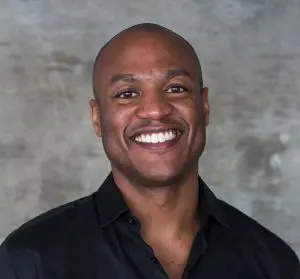My favorite movie is Romancing the Stone. I don’t always admit that. If I’m feeling guarded, the answer is Do the Right Thing or Dead Poets Society. But to get lost in the jungle, seduce a renegade, dig up a giant emerald, fly off a waterfall and live to write the tale? That was all I ever wanted to do with my life, starting when I was nine years old.
While writing was the safest part of Joan Wilder’s adventure, it has been the riskiest of mine—and not just financially. Becoming a writer also meant confronting the fantasy of a neat and singular career arc. Like many people with artistic passions, I’d started out imagining I’d have a “day job” that could keep me going until my writing career took off, then do that full-time in its place.
That never came to pass. Instead, I found an alternative approach somewhere along the way, one that lets me balance two careers as a storyteller—one as a screenwriter and one as a communications manager at Google. Here’s how I managed to make that happen, and what I’ve learned in the process.
Related: This Is What It Takes To Start Your Career At Facebook, BuzzFeed, Nike, And Refinery29
Early Days Dabbling
In my first four years after undergrad, I cycled through a few different roles. I was a magazine editor (six months), a Hollywood assistant (one year), an ad-agency temp (six months), and a tech PR guy (two years). I liked PR the least, but somehow I lasted in that stint the longest. I hated cold-calling reporters. They usually hung up on me. But I kept showing up at work the next day, even when some of my colleagues didn’t.
In 2001, when the so-called “New Economy” crashed, I was working for a small PR agency that specialized in internet startups. One by one, our clients’ domains went dark. In the aimless days following my layoff, I became strangely obsessed with Animal Planet. The creatures helped me reconnect with my basic needs. I had water, food, and shelter, but none of my post-college jobs had nourished what I saw as basic career fulfillment.
So I decided the tech bust was a great time to refresh my artistic dreams, and followed a friend to Madrid. I committed to staying long enough to write my first book-length collection of short stories. For a year, I wrote every day from midnight until 4:00 a.m. I taught English in the afternoons and survived on caffeine and street kebabs.
To complete this bohemian arc, I moved to Manhattan and took a job as a bartender, thinking I’d have time during the day to look for publishers. I was wrong. Working all night meant I had to sleep during the day. My stories got rejected everywhere. So I swung from the bartending vine back into showbiz, after scoring an impossible interview to be the writing assistant on All My Children.
I got hired as the casting assistant instead. At first, this was devastating. But as I soon recognized, life was full of hidden airbags. The bar had given me endless character templates. The casting job brought me face-to-face with talented artists, all of whom were finding their own ways to cope with rejection every day.
Related: Inside My “Deadline Year” For Making My Dream Job A Reality
Continuing Education (In Multiple Fields)
But I still felt like I was waiting to break through, so I decided to apply to MFA programs in creative writing. To make money in the meantime, I returned to PR—yet another “day job”—where by now I was something of a veteran. When the academic year started, I convinced my boss to let me scale back to half time. I sold the idea by also offering to help establish the agency’s East Coast footprint, where I was returning for school. We picked up a handful of major clients as a result.
Somewhat accidentally, I was advancing professionally in a field I had always thought of as just a stopover until my writing career accelerated. And while I didn’t realize it at the time, the next two years also served as a further investment in my PR education. Every client was its own case study. For every chapter of my thesis (a novel about a gay man’s spectacular West Hollywood downward spiral), there was a launch or a crisis or an acquisition or a management change that required its own comms strategy.
When I graduated, the literary journal Puerto del Sol published one of the short stories I’d written as part of my degree program: the indulgently titled “Erotic Reparations,” about psychological warfare in an interracial love triangle. My first publication, this was a major milestone, but professionally it didn’t make things any easier. For one thing, I didn’t hate PR anymore. I was already making much bigger decisions and doing less trench work. Reporters had started taking my calls. Yet the validation of seeing my fiction in print made my ambition to become a best-selling author a bigger and hairier beast. My reflex was a fresh burst of wanderlust (for the inspiration!), so I decided to move to Berlin.
Continually underwritten by freelance PR work, my writing flourished during my 30 months at Checkpoint Charlie. I connected with a local film director looking for an English writer, and nine months later we sold our script to a local production company. (Entitled Do Not Disturb, it’s a moody film noir about love across borders, and still mired in production purgatory to this day.) By networking aggressively with the heads of other film companies, I eventually got hired as a story editor on movies in production.
Falling In Love With My “For Now” Job
By now, it was clear to me that the “day job” model no longer reflected my actual career. I’d backed into something that let me do both more or less successfully. I realized, fitfully at first, that maybe I wasn’t holding out for a big break after all. Maybe I’d broken into something else completely.
Related: Five Things I’ve Learned As A New Manager At Google
I remember the exact moment when I fell in love with PR. One of my strategies—which culminated in using the word “sex” in the headline of a press release—landed a smartphone security client in Cosmopolitan. This was gratifying in a way I’d never thought possible. Also, “content creation” was emerging as a marketing discipline. PR clients began demanding storytellers who could tweet, blog, and write Op-Eds in brand voice. My fiction training became a compelling differentiator.

Many multitaskers experience the reverse correlation between free time and productivity, but for me something clicked. Maybe my PR work was informing my creative work, or maybe I was just great at task-switching. Whatever it was, I spent a year writing on this schedule and another year submitting the draft and getting rejected. In those moments, I remembered my soap studs, valiantly getting turned down from one casting call to the next. But even so, I felt I’d hit my stride.
Finding My Underlying Purpose
A week after accepting an offer from the comms team at Google, I found out that one of my scripts had become a finalist in the 2016 L.A. Comedy Festival screenplay competition. This one was a TV pilot about a transgender head of state who had to save her LGBTQ nation from straight-making zombies.
But this time, while the recognition was exhilarating, it did not make me want to abandon Mountain View. Among other things, Google had hired me to handle external diversity communications. And for the first time ever, the two careers served something I felt was a deeper calling: to shape more inclusive cultural narratives and drive conversations about equality.
I haven’t written any new fiction in the 16 months since I started the job. But I know I’m doing my life’s work. Which brings me back to that movie theater: For Joan, it was flying over the edge that mattered most, not which side of the river she landed on.
Ty Sheppard is on the corporate communications team at Google. To date, he is the author of five screenplays, 20 short stories, and one novel, in varying states of production and publication.
Recognize your brand’s excellence by applying to this year’s Brands That Matter Awards before the early-rate deadline, May 3.
